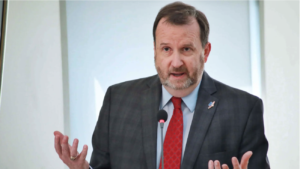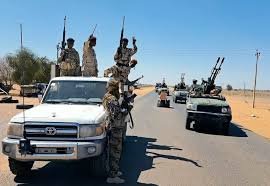THE UNITED STATES government has strongly refuted claims that its foreign aid agency, the United States Agency for International Development (USAID), is funding Boko Haram or any terrorist group in Nigeria.
The US Ambassador to Nigeria, Richard Mills, addressed the allegations late Wednesday night following a meeting with the Nigeria Governors Forum in Abuja. He reassured that if any evidence emerged supporting the claims, the US government would collaborate with Nigerian authorities to investigate it thoroughly.
The allegations surfaced after US Congressman Scott Perry, a Republican from Pennsylvania, claimed during a congressional hearing that USAID funds might be reaching terrorist organisations. Speaking at the Subcommittee on Delivering on Government Efficiency on February 13, Perry alleged that American taxpayer money—amounting to nearly $697 million annually—was being funnelled to extremist groups, including Boko Haram.
“Who gets some of that money? Does that name ring a bell to anybody in the room? Because your money, your money, $697 million annually, plus the shipments of cash funds in Madrasas, ISIS, Al-Qaeda, Boko Haram, ISIS Khorasan, terrorist training camps. That’s what it’s funding,” Perry declared.
His statement triggered immediate reactions, with Nigeria’s Senate calling on National Security Adviser Nuhu Ribadu, the National Intelligence Agency, and the Defence Intelligence Agency to probe the allegations.
Responding to the claims, Ambassador Mills reaffirmed Washington’s firm stance against terrorism and insisted that USAID follows strict protocols to prevent aid from falling into the wrong hands.
ALSO READ: Senate Grills Security Chiefs Over USAID Terror Claims
“Let me be clear—there is no friend of Nigeria stronger in condemning Boko Haram’s violence and disregard for human life than the United States,” Mills asserted.
He emphasised that since 2013, the US government has designated Boko Haram as a foreign terrorist organisation, a move that blocks the group from transferring assets through American financial institutions and allows US authorities to arrest and prosecute its members.

“We cooperate in investigations with the Nigerian government. I can assure you that we have strict policies and procedures to ensure that USAID funding or any other US assistance, whether from USAID, the Department of Defence, or the State Department, is not diverted to terrorist groups like Boko Haram,” Mills stated.
“There is absolutely no evidence of such diversion, and if we ever had evidence that any programme funding was being misused by Boko Haram, we would immediately investigate it with our Nigerian partners.”
The controversy over USAID funding comes at a time when Nigeria is still grappling with the devastating impact of Boko Haram’s insurgency. The Explainer gathered that since the group’s founding in 2002 by Mohammed Yusuf, its violent campaign has led to the deaths of thousands, the destruction of property worth billions of Naira, and the displacement of entire communities.
Boko Haram, originally formed with the aim of imposing Sunni Islamic rule while opposing Shia Islam, has since evolved into one of Africa’s deadliest terrorist groups, launching attacks across Nigeria, Chad, Niger, and Cameroon.
Amidst the persistent security crisis, the debate over foreign aid has reignited concerns over how international funds are monitored and utilised. The US, being one of Nigeria’s biggest development partners, has consistently provided financial and military assistance to help combat terrorism and stabilise the region.
Ambassador Mills also addressed concerns over former US President Donald Trump’s stance on foreign aid, clarifying that his administration did not implement outright cuts but rather paused some funding for 90 days to reassess its effectiveness.
“No assistance has been cut yet, and no decisions have been made about the future of our assistance,” Mills explained.
He pointed out that US Secretary of State Marco Rubio had assured that the review was not about ending foreign aid to countries like Nigeria but rather about ensuring it aligns with US government priorities.
“That’s what this 90-day pause is for. However, there are waivers for life-saving assistance, such as support for HIV patients, maternal and child nutrition, and internally displaced people. So that continues. In 90 days, we will know where we stand,” Mills stated.
Beyond the immediate debate over aid, the Explainer learned that Ambassador Mills also discussed broader areas of cooperation between the United States and Nigeria.
He outlined four key priorities shaping the US-Nigeria relationship:
- Boosting trade and investment by improving the business climate.
- Enhancing transparency and accountability by tackling corruption and supporting civil society efforts for good governance.
- Strengthening engagement at the subnational level, with direct support to Nigerian states and local governments.
- Ensuring the sustainability of healthcare programmes, particularly those targeting HIV, polio, and maternal health, so they can transition to full Nigerian government ownership.
The Explainer reported the Nigeria senators have looked into claims made by US Congressman Perry Scott that the US Agency for International Development has been providing financial support to terrorist groups, such as Boko Haram, and the Senate has invited intelligence chiefs. the resolution came after Senator Mohammed Ndume, who represents the Borno South Senatorial District, raised an Order of Urgent National Security under Order 41.






















